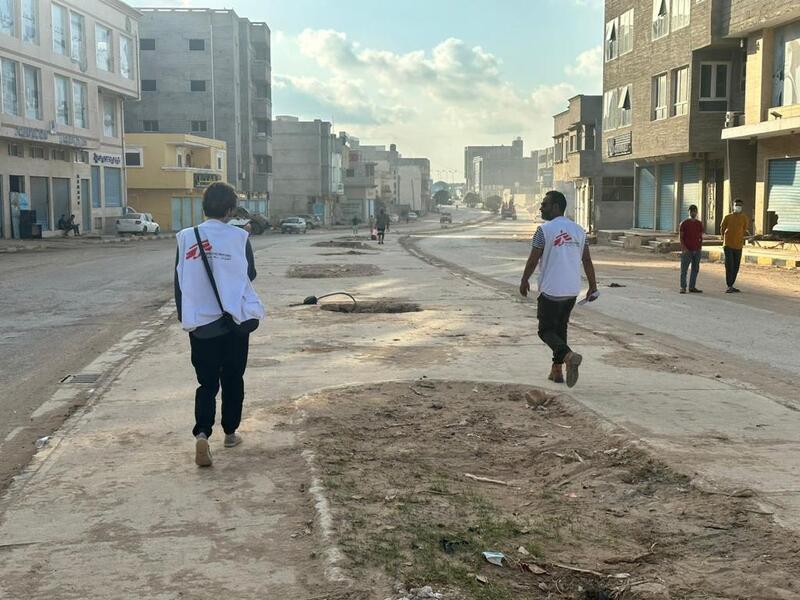Three months after thousands of people lost their lives in devastating floods caused by Storm Daniel, residents of the city of Derna are suffering the psychological aftermath of the disaster. MSF doctors and psychologists have been providing them with medical care and mental health support.
On Sunday 10 September 2023, Storm Daniel, which had already caused extensive damage in Spain and Greece, strengthened as it passed over the Mediterranean Sea before making landfall on the coast of Libya. The strong winds and intense rainfall caused two dams to burst upstream of the coastal city of Derna in northeastern Libya. At around 2.30 am on 11 September, a deadly wave engulfed part of the city centre, destroying apartment buildings and sweeping away thousands of sleeping residents in a torrent of mud.
Just as photos show clocks found in the rubble stuck at the precise time the tragedy struck, three months after the disaster official figures have stopped at 4,500 dead and more than 8,000 missing. Meanwhile the survivors are struggling to deal with their shock and grief.
"Derna is currently in a terrible state of grief and silence,” says MSF psychologist Asma Amaraa. “People are still in constant mourning."
The first MSF team arrived in Derna three days after the disaster to assess people’s medical and humanitarian needs and donate body bags and other emergency supplies to health authorities.

At the time, the most urgent need identified by the MSF team was to provide psychological support to displaced people who had lost family members, homes and possessions and who had taken refuge in classrooms converted into temporary shelters. The other group they identified as needing support consisted of medical staff and volunteers, some of whom had themselves been bereaved by the floods and who were exposed to the psychological distress of the victims.
Ten days after the disaster, the MSF team had started providing general medical consultations at two health centres, one on each side of the destroyed city centre, as well as psychological support through individual and group sessions.
To date, MSF doctors have provided medical consultations to more than 4,480 patients in Derna, both children and adults, the majority for hypertension, upper respiratory tract infections and stomach aches. They have found that often patients’ conditions have a psychological rather than a physical cause.
"We quickly noticed that in many cases, patients were coming with symptoms that were more psychological than physical," says MSF’s Dr Mohamed Ibrahim Algablawi. Many complained of headaches, chest tightness, shortness of breath, back and stomach pains and hot flashes.
More than 230 patients went on from primary health consultations to receive support from MSF’s mental health team. This is despite the fact that mental health issues are regarded by many in Derna as a source of shame. "In Derna, everyone knows everyone else, and coming to see a psychologist is still often stigmatised," says one of the psychologists in the MSF team.
Since the disaster, MSF psychologists have provided psychological support to 1,000 patients, in individual sessions or group sessions. They report that many of their patients show signs of anxiety or violent tendencies; others cry constantly or describe feelings of distress, sadness and fear.
"They have nightmares, they have the impression that the disaster could happen again, they are afraid of rain, clouds, climate change,” says an MSF psychologist. “They are haunted by the fear that the floods could happen again."
Despite the deep psychological wounds of many residents, and despite the visible scars in the physical fabric of the city, life in Derna is now slowly returning to normal. The temporary shelters for displaced people have gradually been closed, reconstruction work has begun. When schools finally reopened, MSF psychologists have also been involved to help teachers cope with this particularly difficult start to the new school year.



